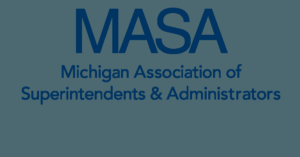 Michigan Education Organizations React to Final School Aid Budget
Michigan Education Organizations React to Final School Aid Budget
LANSING, Mich. — Following the Michigan Legislature’s passage of the state budget, the Michigan Association of Superintendents and Administrators, the Michigan Association of School Boards, the Michigan Association of Secondary School Principals. Michigan Association of Intermediate School Districts issued the following joint statement:
“After months of unnecessary delay, and in clear violation of state law and the Constitution, the Legislature has finally passed the School Aid budget — over three months late.
“Educators were left watching the news alongside the general public for details of the budget’s contents, which were released only hours before the vote on a bill more than 400 pages long. This lack of transparency erodes and undermines the partnership that schools should be able to rely on with their state leaders.
“We are relieved that schools will receive their October 20 state aid payments on time, providing districts with more certainty. We also appreciate that this budget includes meaningful investments in public education that will benefit students across Michigan.
“However, those gains are undercut by questionable choices. Once again, lawmakers have diverted School Aid Fund dollars to cover higher education costs — a move that reduces the resources available for K-12 schools. The budget also reduces the state’s share of funding for the MPSERS retirement system, shifting more of the burden onto local districts.
“In addition, the damage from this needless delay forced districts to borrow, freeze programs, and make painful staffing decisions. The trust between school leaders and the state government has been shaken, and restoring it will require more than a budget vote — it will require structural reforms to prevent this from happening again.
“Michigan’s students deserve a stable, timely, and transparent budgeting process, which is why we will now be working on policy proposals that prevents this situation from happening again.”
Following chaotic FY26 budget process, schools urge timely action on next budget
Lansing, MI – Peter Spadafore, executive director of the Michigan Alliance for Student Opportunity, issued the following statement following passage of the fiscal year 2026 school aid budget:
“We are relieved that the Legislature has finally passed a K-12 school budget, providing districts with the clarity they need to move forward and significant investments in at-risk funding, bi-lingual education, and per-pupil funding. But let’s be clear: this process cannot become the norm. As of today, there are fewer than 272 days until the next legal budget deadline of July 1, 2026.
“Michigan students, families, and educators deserve more than last-minute deals. They deserve responsible budgeting that meets legal deadlines and allows schools to plan with certainty. Delays this year forced districts into impossible choices — cutting programs, reducing services, or laying off staff. That is the real cost of legislative inaction.
“Lawmakers must treat the July 1 deadline as non-negotiable. An on-time budget is not just a legal requirement; it is the bare minimum for ensuring every Michigan child has the stability and resources they need to succeed.”
MCAN’S Reaction to the New Budget
“MCAN is encouraged to see that investments in K-12 and higher education investments have been maintained through a tough budget cycle,” said MCAN Executive Director Ryan Fewins-Bliss. “The path to a thriving economy and strong communities relies on ensuring that all Michigan students — especially students from low-income backgrounds, first-generation college-going students, and students of color — have access to quality postsecondary education that leads to good jobs and stable careers. It is crucial to our state’s future that we continue to increase educational funding and expand opportunities for our residents.”
MEA statement on passage of 2025-26 education budget
EAST LANSING — The following statement can be attributed to MEA President & CEO Chandra Madafferi regarding the Legislature’s passage of the 2025-26 education budget:
“While overdue and still with areas of concern, the education budget for this school year is finally complete and makes important investments in the success of Michigan’s students and the educators who serve them.
“This budget significantly increases per pupil funding, plus providing more resources to equitably meet the unique needs of at-risk students in poverty, special education students, English language learners and more. It continues funding for essential programs like free school meals, student safety and mental health, and recruiting and retaining great educators for every Michigan student.
“Most critically, it provides $200 million in funding to directly put money in the paychecks of public school employees – whose pay increases are being consumed by skyrocketing out-of-pocket health insurance costs.
“We remain concerned about the long-term implications of shifting higher education costs to the School Aid Fund to free up General Fund money for roads, as well as cuts to state support for district payments into the educator retirement system. Although this budget compromise does not include all of our priorities, we welcome that it provides much-needed support and certainy for PreK-12 schools and higher education institutions to meet the needs of Michigan students.”
Michigan Health & Hospital Association Media Statement
The following statement can be attributed to Brian Peters, CEO of the Michigan Health & Hospital Association, following comments made by Michigan House of Representatives Speaker Matt Hall.
Michigan’s elected officials demonstrated today a strong, bipartisan commitment to protecting healthcare funding in the state budget. We thank all of those who worked together when it mattered most, especially Gov. Whitmer, Senate Majority Leader Brinks and Speaker of the House Hall for their leadership in agreeing to a budget that will continue to advance the health of individuals and communities throughout the state. Hospitals, healthcare workers and patients have secure state funding for another year, maintaining access to care and protecting important service lines.







